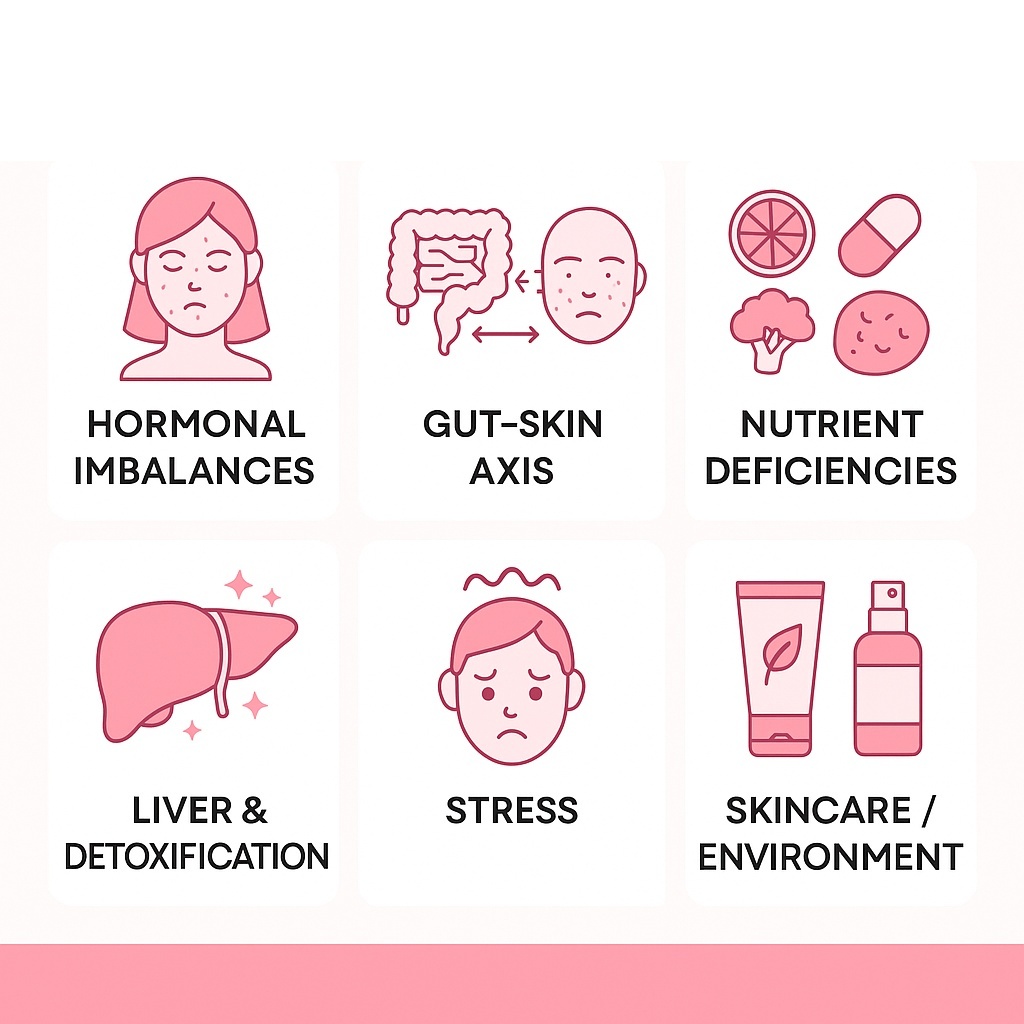Understanding the Root Causes of Acne: A Nutritional Therapist’s Guide
By Lucy Sugars, Nutritional Therapist
Acne is one of the most common skin concerns—affecting not just teenagers, but adults well into their 30s, 40s and beyond. If you’re feeling frustrated by persistent breakouts, you’re not alone—and there’s more to acne than meets the skin.
While topical treatments and skincare routines have their place, it’s important to understand that acne is often a symptom of underlying imbalances. As a nutritional therapist, I work with clients to address acne from the inside out—supporting skin health through targeted nutrition, gut health, hormone balance and lifestyle changes.
In this post, I’ll walk you through the key root causes of acne that I commonly see in clinic, and share evidence-informed insights into how nutrition can support clearer, healthier skin.
1. Hormonal Imbalances
Hormonal fluctuations—particularly involving androgens like testosterone—can lead to increased oil (sebum) production, clogged pores and inflammation. This is especially common in:
- Teenagers during puberty
- Women with polycystic ovary syndrome (PCOS)
- Around the menstrual cycle
- During perimenopause
How nutrition helps:
- Balancing blood sugar is critical. Frequent spikes in insulin can worsen androgen activity and inflammation.
- Choose whole, unprocessed carbohydrates (e.g. oats, sweet potatoes, brown rice)
- Avoid refined sugars and excessive dairy (especially skimmed milk, which can spike insulin)
- Include protein and healthy fats with each meal to keep blood sugar steady
2. Gut-Skin Axis Disruption
Emerging research highlights the strong link between gut health and skin. Dysbiosis (imbalances in gut bacteria), intestinal permeability (‘leaky gut’), or a sluggish bowel can all contribute to systemic inflammation and toxin overload—both of which can trigger or worsen acne.
How nutrition helps:
- Add fermented foods (like sauerkraut, kimchi, kefir) for probiotics
- Include prebiotic fibres (onions, garlic, leeks, chicory) to feed good bacteria
- Stay hydrated and aim for regular bowel movements—support with flax, chia, or kiwi fruit if needed
- Some individuals benefit from stool testing to assess for imbalances, infections, or inflammation in the gut.
3. Nutrient Deficiencies
Your skin is a reflection of your internal nutrient status. Acne-prone individuals are often low in certain key nutrients, including:
Zinc: Supports wound healing, reduces inflammation and regulates sebum
Vitamin A: Aids skin cell turnover (excess can be toxic—work with a practitioner)
Omega-3s: Anti-inflammatory fatty acids found in oily fish, flax, chia, walnuts
Vitamin D: Plays a role in immune regulation and skin barrier integrity
How nutrition helps: Testing can help identify low levels. In clinic, I often recommend a food-first approach, supported with tailored supplementation where appropriate.
4. Liver and Detoxification Support
The liver is responsible for breaking down hormones, environmental toxins and by-products of metabolism. If detox pathways are sluggish or overwhelmed, this can lead to hormone recirculation and increased inflammation.
How nutrition helps:
- Eat a variety of cruciferous vegetables (broccoli, cauliflower, kale, rocket) which support liver enzyme activity
- Ensure regular elimination (daily bowel movements)
- Support glutathione production with foods like asparagus, spinach, and whey protein
5. Stress and the Skin
Chronic stress raises cortisol levels, which can increase inflammation and disrupt hormone balance. Stress can also affect gut health and reduce nutrient absorption—creating a cascade of skin-damaging effects.
How nutrition helps:
- Prioritise magnesium-rich foods (dark leafy greens, pumpkin seeds, avocado)
- Reduce caffeine and alcohol, which can heighten stress responses
- Support the nervous system with adaptogens (these need professional guidance)
I also encourage clients to explore stress-reduction strategies like yoga, breath work, journaling, and time in nature.
6. Food Sensitivities and Inflammatory Triggers
For some individuals, acne may be triggered by food sensitivities. Dairy, refined sugars, and in some cases gluten are common culprits. These don’t cause acne in everyone, but for sensitive individuals they may exacerbate inflammation and disrupt gut function.
How nutrition helps:
An elimination diet—done under supervision—can help identify specific triggers
Keep a symptom diary to spot patterns between food intake and breakouts
Reintroduce foods gradually, observing changes in skin health
7. Skincare, Environment and Hygiene
While internal health plays a key role, we can’t overlook the importance of topical factors too:
Avoid comedogenic (pore-clogging) products
Clean pillowcases, makeup brushes, and mobile phones regularly
Choose non-foaming, non-stripping cleansers
Where needed, I may refer clients to a skincare specialist to complement the internal work we’re doing.
The Bottom Line
Acne is complex and highly individual. A ‘one-size-fits-all’ approach rarely works—which is why a personalised strategy is key. By looking beyond the surface and exploring the underlying drivers—whether hormonal, digestive, nutritional or lifestyle-related—we can support real, lasting improvements in skin health.
If you’re struggling with acne and feel like you’ve tried everything, know that support is available. As a registered nutritional therapist, I offer comprehensive skin consultations to explore your health history, diet, hormones and gut health, and create a bespoke plan tailored to you.
Interested in working together?
Feel free to get in touch to book a free 10 minute to chat and see if nutritional therapy could support your skin journey.


